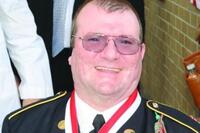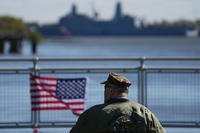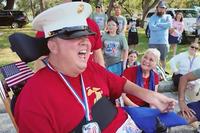Carl Blake is the executive director for Paralyzed Veterans of America.
A recent article in The New York Times painted veteran service organizations (VSOs) as being at odds with each other and the Department of Veterans Affairs, an idea I have heard echoed elsewhere. This, and a supposed rift between "legacy" organizations and those that represent the younger (post-9/11) generation, is shortsighted and just plain wrong.
As a West Point graduate, U.S. Army veteran, and member of Paralyzed Veterans of America (PVA), I know firsthand the benefits of the services provided by all VSOs, old and new, including PVA, and have had the privilege of working for and with many of them for nearly 18 years.
It's true that since 9/11 many nonprofits have been formed to support first responders, active-duty military and veterans. The VSO nonprofit leaders we work with on a daily basis have been very focused on identifying particular areas of expertise to purposefully limit duplicative efforts.
For example, at PVA, we are primarily focused on providing lifelong support, programs and advocacy for veterans with spinal cord injury and disorders (SCI/D) and fighting for the civil rights of all people with disabilities. This work is not targeted to a single generation of veterans. Additionally, PVA is not a dues-based organization but a 501(c)(3) nonprofit organization that provides programs at no cost to all veterans through the generous support of the public.
The most troublesome suggestion from the article is that VSOs, particularly "legacy" organizations and newer organizations, are not working together, which could not be further from the truth. Collaborations are everywhere in the VSO community. For example, PVA is currently partnering with Student Veterans of America (SVA) and Wounded Warrior Project (WWP) to expand SVA's Disability Services Liaison program. By working together, SVA, PVA and WWP hope to help more student veterans access underutilized campus and education resources.
Collaborations with the VA are also numerous. In fact, in July 2019, PVA will host the 39th annual National Veterans Wheelchair Games in partnership with the VA. These Games are the largest event of its kind. The strength of the Games is in the camaraderie, competition and shared experience the event has created for the more than 600 veterans participating. Last year, the Independence Fund, WWP and Disabled American Veterans (DAV), all mentioned in the article, either sponsored the event or sent teams or individuals to participate in this multi-day sporting event.
It is the responsibility of VSOs, like PVA, to continue to push the VA to provide the best services possible. That doesn't necessarily mean we are at odds. It means we're standing guard and sharing our views in an attempt to affect change and doing that in a collaborative way.
For more than 70 years, PVA has been working hand in hand with the VA to provide the best possible health care for veterans with SCI/D specifically, as well as for all veterans seeking services from the VA. Our services literally start at the bedside because we have full-time staff at all VA SCI/D centers to help veterans with their specific needs, and we stay engaged throughout their entire recovery and rehabilitation.
Additionally, we provide training, education and research to VA and non-VA SCI/D clinicians across the U.S. to inform treatment options. Working with our VSO counterparts at DAV and Veterans of Foreign Wars (VFW), we provide budget and policy recommendations about VA health care and benefits through "The Independent Budget," a collaborative effort that has informed Congress and the VA for more than three decades.
Advocacy is mission critical for veterans and their families. Being a collective voice and representing many points of view has resulted in legislation that has impacted millions of Americans, to include all generations of veterans. At PVA, we have provided critical leadership in the passage of important disability civil rights laws, such as the Americans with Disabilities Act, the Air Carrier Access Act, and amendments to the Fair Housing Act. These laws protect the civil rights of not only every veteran with a disability, but all people with disabilities.
VSOs are working together and with our nation's leaders. This was evident this past summer with the passage of the VA Mission Act. More than 30 VSOs endorsed the legislation and provided critical input. The VA Mission Act addresses access to community care, requires the VA to assess its infrastructure, and expands access to critical caregiver benefits. This comprehensive piece of legislation is illustrative of the collective power of the veteran community and the desire to work together to improve the lives of veterans of all eras.
This is not to say we cannot do more in the VSO community. Success is a moving target, which requires constant focus, attention and collaboration. To solve complex issues, many viewpoints must be heard to arrive at the best possible outcomes. After all, this is our shared goal -- to help veterans. This is what those who are defending our freedoms deserve, and we should all give our time, energy and resources toward supporting anyone and any group that is doing so. That is why PVA will continue to embrace the future and evolve, as we have for decades, to address the challenges faced by every generation of veterans, as well as all people with disabilities.
In the meantime, we invite every interested person to learn more about the incredible work we do in the VSO community. Better yet, come spend a week with us in Louisville, Kentucky, this July during the National Veterans Wheelchair Games, and experience what fellowship and collaboration among VSOs of every generation, legacy or new, and the VA looks like at its very best.
-- The opinions expressed in this op-ed are those of the author and do not necessarily reflect the views of Military.com. If you would like to submit your own commentary, please send your article to opinions@military.com for consideration.















